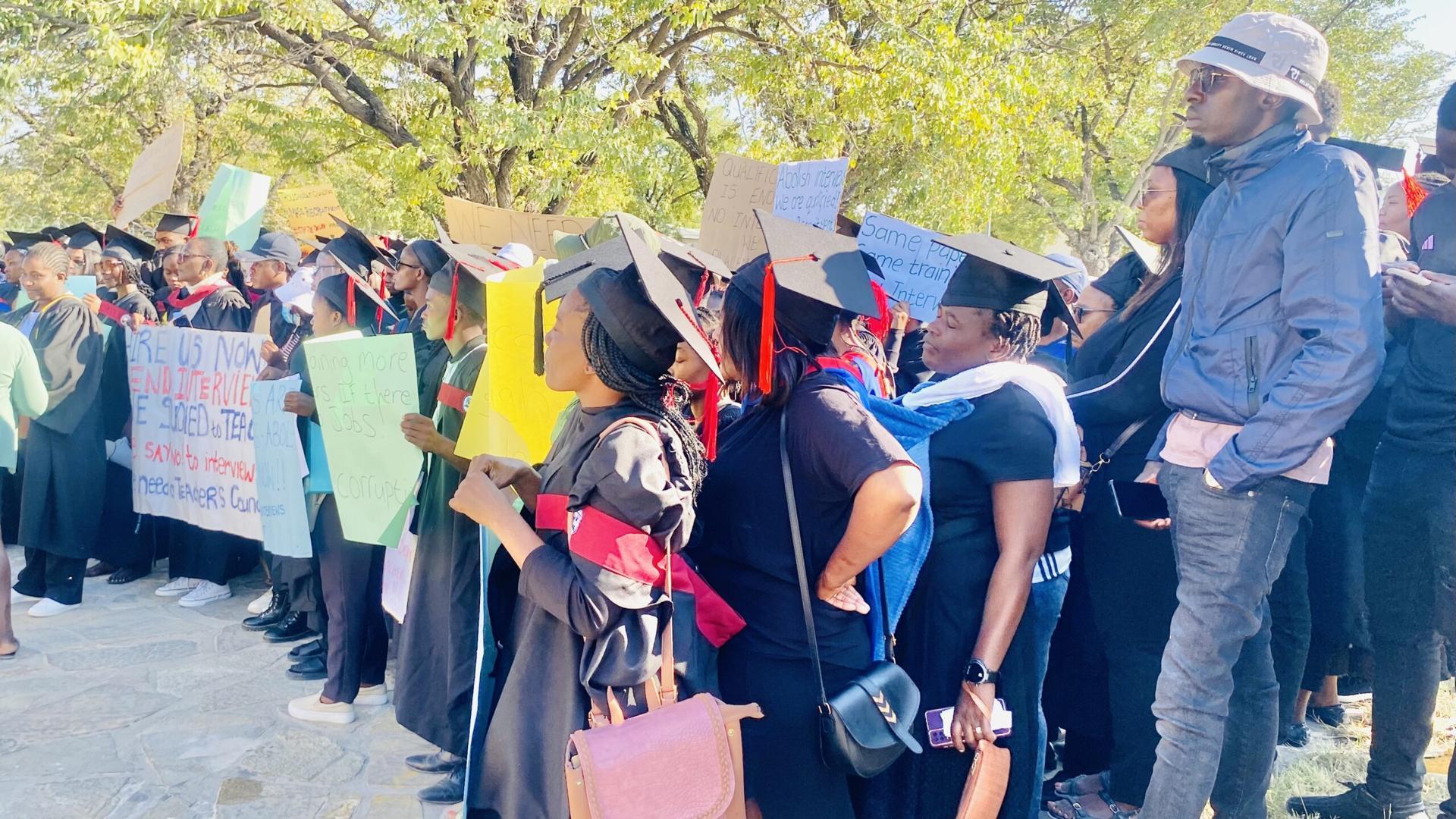Africa-Press – Namibia. Unemployed qualified teachers from the Oshana region took to the streets of Oshakati on Tuesday to register their frustrations.
They said their qualifications are collecting dust, with the graduates facing dire economic circumstances.
The protesters in Oshakati demanded immediate action from the education ministry, particularly to reform the recruitment process.
The protest was sparked by what they describe as systemic injustices in the recruitment process, including the requirement for interviews that may be deemed unnecessary and exclusionary.
The teachers presented a petition outlining several key demands – the abolishment of interviews, mass recruitment, creation of a national teacher database, implementation of a year of accomplishment policy and adherence to the teacher-learner ratio policy.
Speaking on behalf of her unemployed colleagues, Mariana Kambonde said they have been ignored for far too long.
“We stand to express our deep concern over the current state of the recruitment process for teaching positions. We have engaged the ministry at a regional and national level across the country, including the director’s office,” she said.
As of 2025, Namibia faces a critical challenge in addressing the growing number of unemployed graduates, particularly within the education sector.
Between 2017 and 2023, approximately 8 251 qualified teachers have remained unemployed, contributing to the nation’s alarming unemployment rate of 36.9%. With an estimated 3 000 additional graduates expected to enter the job market in 2024, the total number of unemployed teachers is projected to exceed 15 000.
“We believe the ministry has lost its direction in education. It has failed the country in many aspects of giving employment to unemployed qualified teachers,” Kambonde said.
While presenting the petition, she stated that institutions of higher learning are not properly regulated.
As a result, they are failing to respond to the economic demands and set goals of the country.
“There is a mismatch between what the institutions are producing and the needs of the labour market. The ministry should lead the fight toward the complete halting of education courses – at least for five years,” she said.
The protestors issued a 72- hour ultimatum.
“We will, therefore, camp at the ministry until we get positive answers,” they demanded.
Desperate times
Ndeshi Nghihangwa, a qualified teacher who has been unemployed for five years, revealed to New Era her daily hardships in her pursuit of employment.
Despite her qualifications, she finds herself subjected to extreme challenges during the interview process.
“We are forced to sleep at service stations due to a lack of money for better accommodation. The financial burden is further increased by the cost of making multiple copies of documents for every application, and having to borrow money each time,” she lamented.
Response
Responding to the unemployed teachers’ plights, education executive director Mbumba Haitengela said the ministry sympathises with them.
He said recruitment is governed by constitutional and legal frameworks, including the Employment Services Act and the Public Service Act.
“The ministry must ensure quality within the education sector. Therefore, all recruitment procedures should be rigorously enforced to ensure the suitably qualified candidate is appointed and will ensure quality educational outcomes. This means interviews are a mandatory part of this process,” he stated.
He attributed the crisis to a mismatch between the number of graduates and available teaching positions.
Haitengela said while the national average teacher-to-learner ratio is 1 to 27 across all grades, some urban schools experience overcrowding, with classrooms accommodating up to 50 learners per teacher.
Conversely, rural areas face underutilisation of schools due to factors such as rural-urban migration and perceptions that education quality is better in urban centres.
Plan
The ministry is working on a plan to repurpose under-utilised schools for various options, such as turning these schools into community learning and development centres, resource schools for learners with special educational needs and disabilities or other feasible uses in line with its mandate.
Efforts are underway to conduct a post-provisioning norm audit and develop a three-year regional decongestion plan.
With over 54 000 five- and six-year-olds not yet in the formal education system, the ministry plans to expand Early Childhood Development programmes.
These will require the construction of approximately 1 935 classrooms and creation of 1 935 teaching posts.
In addition, the ministry is prioritising the training of teachers in areas with acute shortages.
These entail secondary education, technical subjects and specialised qualifications for resource schools.
For More News And Analysis About Namibia Follow Africa-Press






